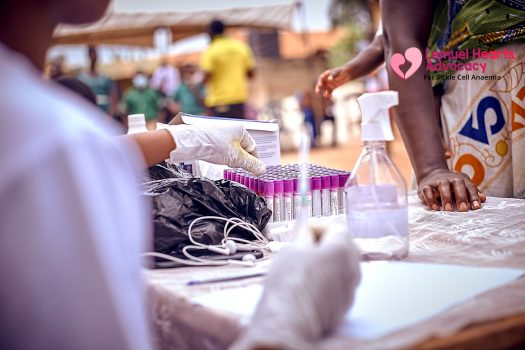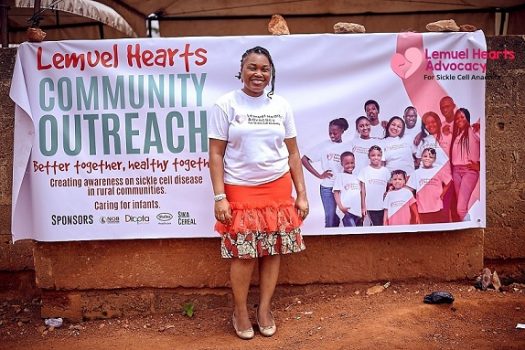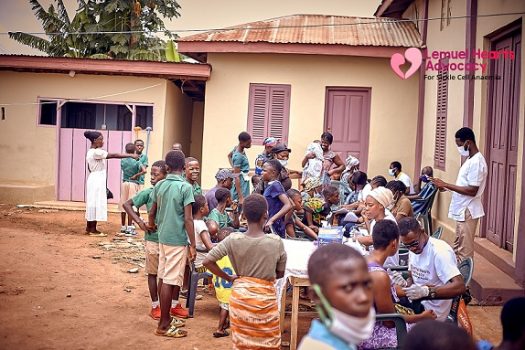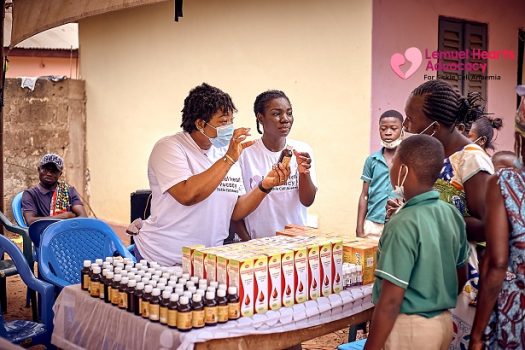
Story by Bernard Buachi
Dr. Yvonne Woyome; a Physician at the Komfo Anokye Teaching Hospital and Executive Director of the Lemuel Hearts Foundation for Sickle Cell is appealing to the government not to take Hydroxyurea; an important Sickle cell medication off the NHIS drug list.
She spoke after her NGO held an outreach at Oman Homabenase in the Bosomtwi district of the Ashanti region to sensitize the community on the sickle cell condition ahead of the World Sickle Cell Awareness Day celebration. They also screened the residents for the condition and provide various medications and baby food for the kids. The Foundation also advised them to make breeding decisions based on sickling statuses.

Founder and Executive Director of the Lemuel Hearts Foundation; Dr. Yvonne Senam Woyome who revealed that an alarming two percent (2%) of all live births in Ghana annually have sickle cell, also expressed concern that Hydroxyurea; an important sickle cell medication was going to be withdrawn from the NHIS drug list and appealed the government to reconsider that decision. She further called on the government to take up the cost of laboratory treatments for Sickle Cell patients to enable them take their tests frequently and enjoy better health.
“A sickle cell patient on medication will have to visit the hospital every month for tests which will cost around one hundred cedis and do some more tests every three months that will cost even more” she explained.
She was sad that Ghana has not done well so far in creating awareness on sickle cell and hence reducing the condition and stressed the need for sickle cell to be brought to the forefront of national conversations considering the damage it is wreaking.
Saturday, June 19th 2021 is marked around the world as World Sickle Cell Awareness Day. The international awareness day is observed annually with the goal to increase public knowledge and an understanding of sickle cell disease, and the challenges experienced by patients and their families and caregivers.
Dr. Woyome also advised against the reliance on traditional medicine in the case of sickle cell and appealed to corporate entities and passionate individuals to help support Sickle cell awareness creation efforts as it is very difficult to obtain support for their activities. She was full of gratitude for the Assemblyman for the area, District Director of Health for Bosomtwi, a representative of the Chief of Oman and the secretary of the Sickle cell Association of Ghana who all made it a point to attend and contribute to the success of the event.
She was excited about the warm reception they received from the community and hinted that many more of such outreaches will be rolled out in the near future.

The Lemuel Hearts Foundation started operating in Ghana in 2018, creating awareness on the Sickle Cell condition.
Sickle cell anemia, or sickle cell disease (SCD), is a genetic disease of the red blood cells (RBCs). Normally, RBCs are shaped like discs, which give them the flexibility to travel through even the smallest blood vessels. However, with this disease, the RBCs have an abnormal crescent shape resembling a sickle. This makes them sticky and rigid and prone to getting trapped in small vessels, which blocks blood from reaching different parts of the body. This can cause pain and tissue damage.
Symptoms of sickle cell anemia usually show up at a young age. They may appear in babies as early as 4 months old, but generally occur around the 6-month mark.
Some symptoms of Sickle Cell include excessive fatigue or irritability from anemia, fussiness in babies, bedwetting from associated kidney problems, jaundice (yellowing of the eyes and skin), swelling and pain in hands and feet, frequent infections, and pain in the chest, back, arms, or legs.

What do you think about this piece? Share your comment in the comment thread and share the story using the social media buttons above. You may reach the editor on 0249579664. Thank you.